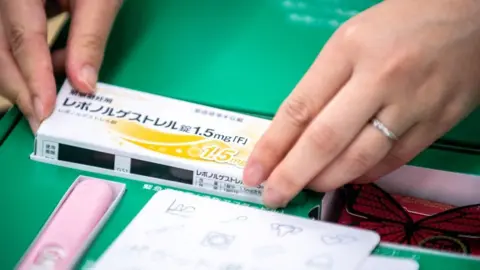Japan begins trial sales of prescription-free morning-after pills
 PHILIP FONG
PHILIP FONGJapan has begun trial sales of morning-after pills without a prescription.
Under the pilot, the pill is set to be available at 145 pharmacies. Until now these had only been available at a clinic or pharmacy with a doctor's prescription.
A public consultation by Japan's health ministry found overwhelming support to make it available over the counter.
Rights groups have criticised the scheme, saying it is too small, and called for restrictions to be lifted.
Under existing rules, women, including victims of sexual assault, have to go to a clinic or hospital for a prescription to obtain emergency contraception
The pills - NorLevo and the generic version levonorgestrel - work best within 72 hours after unprotected sex and have an efficacy rate of 80%.
Selling the drug without a prescription was first discussed by a health ministry panel back in 2017, but officials stopped short of giving it the green light, saying that making the morning-after pill more easily available would encourage irresponsible use of the drug.
The health ministry has now found overwhelming support after a public consultation - 97% in favour - to allow the sale on a trial basis.
Globally, emergency contraceptives are available without a prescription at pharmacies in about 90 countries.
The initial phase of the over-the-counter sale in Japan will cover only 0.2% of the 60,000 pharmacies in the country, which rights groups say is insufficient.
The campaign group Emergency Contraceptives at Pharmacies Project has urged the health ministry to make the pill available fully and rapidly in all drugstores without restrictions.
The organisation's co-chair, Asuka Someya, said: "There are many who say they cannot talk to their parents about possible pregnancy. It's going to be difficult if they have to talk about their sexual experiences and concern about pregnancy."
The World Health Organization has called for emergency contraception pills - commonly known as morning-after pills - to be routinely included within all national family planning programmes.
Dependent on the outcome of the trial, Japan may approve a full-scale rollout.
